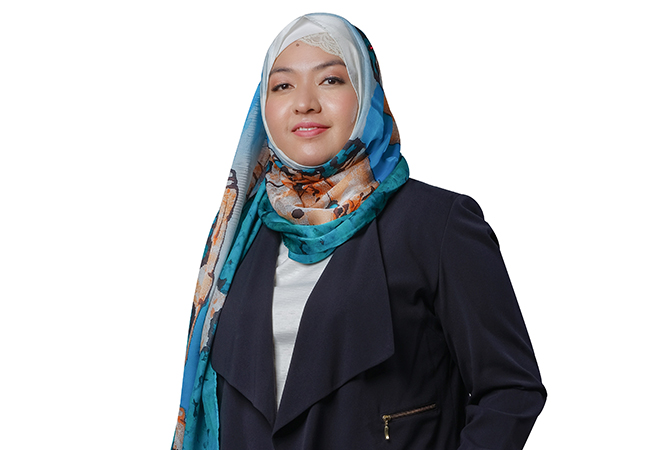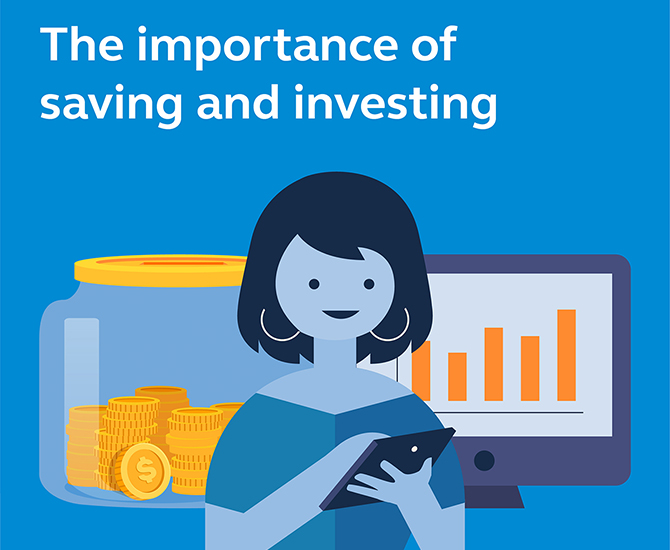Here’s your complete guide to investing for beginners—from how to start to trends to look out for in the “New Normal”

If you’ve always thought of getting into investment but wasn’t sure where to begin, this one’s for you. Getting started can be daunting and terrifying, especially when finances and risks are involved—and especially during a time of economic uncertainty. The global economy has been affected by the COVID-19 pandemic and Malaysia is no exception. With the current Movement Control Order and not knowing what’s going to happen in the near future, it’s completely normal for Malaysians to delay taking the first step into the world of investing.


We had the opportunity to speak to the Chief Executive Officer of Principal Asset Management, Munirah Khairuddin, about all things investment. She shared tips and advice on how to get started, when to begin investing, the dos and don’ts, as well as her thoughts on the realm of investment for Malaysians.
How has the COVID-19 pandemic affected the economy in Malaysia?
“The COVID-19 pandemic is not only affecting the Malaysian economy but the global economy as well. On a macro level, we are seeing weak economic numbers with international institutions such as International Monetary Fund (IMF), Asian Development Bank (ADB), and The World Bank revising their forecasts for the country’s growth.
In the latest World Bank’s June 2020 Malaysia Economic Monitor, the Malaysian GDP is projected to contract 3.1 per cent. Bank Negara Malaysia (BNM), in its Annual Report for 2020, guided that GDP growth for the year will range from +0.5 per cent to -2.0 per cent.
DEFINITION
Gross Domestic Product (GDP)
“The monetary value of all finished goods and services made within a country during a specific period. (It) provides an economic snapshot of a country, used to estimate the size of an economy and growth rate.” (Source)
That being said, COVID-19 is not only an economic threat but inherently, a health crisis. Malaysia has been quick to address both issues with the extraordinary policy support from both the monetary and fiscal side. Through the course of the Movement Control Order (MCO), Malaysia has announced a RM295 billion stimulus package, with RM45 billion as a direct fiscal injection.
DEFINITION
Direct fiscal injection
As MalaysiaKini simply puts it: “A fancy word for cash from the government.”
The measures are to soften the contraction in economic activities and most importantly, assist the most vulnerable in our community. However, over the next six months and beyond, we expect the world economy to recover gradually after the number of new COVID-19 cases peaked and economies begin to resume their daily activities.”
In your opinion, when is the right time to invest in stocks and properties? Is there ever a ‘right time’?
“At Principal, we believe in long-term investing and one of our core expertise is helping customers invest in their long-term goals. A practical investment approach is generally based on a long-term view and investors’ time horizon.
DEFINITION
Time horizon
“The period of time one expects to hold an investment until they need the money back.” (Source)
Understandably, these are indeed unprecedented times of crisis, however, the fundamental thing to know is that market volatility has always been a part of investing. Hence, we believe there are always opportunities in every situation—even now.”
DEFINITION
Market Volatility
“Volatility often refers to the amount of uncertainty or risk related to the size of changes in a security’s value. A higher volatility means that a security’s value can potentially be spread out over a larger range of values.” (Source)
What are the questions to ask for anyone planning to invest now?
“For new investors: Do you have an investment goal? What is your risk tolerance? These are the two most fundamental questions before one begins a journey into investment. For example, we should be able to recognise our risk appetite according to the risk scale spectrum: conservative, moderate or aggressive.
For investors with a conservative appetite, you might want to choose asset classes that are suitable in your portfolio—with low risk and stable returns. Examples: bonds, fixed deposit, and money market instruments. For those with an aggressive appetite, you might want to go for equities with high risk and high returns as compared to bonds.
DEFINITION
Money Market
“The money market refers to trading in very short-term debt investments.” (Source)
A good mix of asset classes would see a 50:50 between fixed income and equities, and would be suitable for those with a moderate appetite. The identification of our risk tolerance would then translate to how we can strategise our investment portfolio to achieve our goals.
DEFINITION
Asset Class
“An asset class is a grouping of investments that exhibit similar characteristics and are subject to the same laws and regulations. Historically, the three main asset classes have been equities (stocks), fixed income (bonds), and cash equivalent or money market instruments.” (Source)
For savvy investors: We are increasing exposure to equities vis-à-vis fixed income as policymakers are likely to pause announcing new measures. This is to allow them to assess the impact of the policies implemented earlier. We are positive on Asia equities on a 12-month basis and has added ASEAN (Association of Southeast Asian Nations) names in anticipation of a broader market recovery going forward.
For conservative investors: We would recommend Malaysians to focus on bond funds and balanced funds that are income-focused.
DEFINITION
Bond Fund
“A bond fund is simply a mutual fund that invests solely in bonds. For many investors, a bond fund is a more efficient way of investing in bonds than buying individual bond securities. It is also referred to as a debt fund.” (Source)
For investors with a higher risk tolerance: Our recommendation is to focus on growth-oriented funds that offer exposure to growth areas in China, Asia-Pacific, Global Technology, ASEAN, and Malaysian aggressive funds.”
DEFINITION
Aggressive Growth Fund
“An aggressive growth fund is a mutual fund that seeks capital gains by investing in the shares of growth company stocks. Investments held in these funds are companies that demonstrate high growth potential, but also carry greater risk.” (Source)


Is a downturn triggered by a virus different from a financial crisis?
“There is a difference in the degree of the economy being affected. A financial crisis would generally impact the financial sector greater whilst the other productive industries should remain relatively intact.
The COVID-19 pandemic has forced global economies to impose a form of lockdown that curtail economic activities across board with exception of essential services and production.
As we are seeing, virtually almost all countries in the world imposed a form of lockdown. Taking a closer look at SARS, similarly with the situation at hand with COVID-19, history has guided the turning point for sentiment will come once the vaccine is invented and escalation of the virus decreases.
The negative sentiment will affect businesses particularly in the consumer, transportation, restaurants, tourism, and retail sectors in the short-term.”
What industries and investments do we expect to rebound the fastest?
“The manufacturing sector and external trade are likely to see the first rebound.”


If someone is investing for the first time, what are the major dos and don’ts to take note of?
“You’re probably thinking, ‘I’d love to see my money grow. How can I get started investing?’ The three rules below can help you form a solid investment plan:
- Start investing as soon as you can — The more time your money has to work for you, the more opportunity it’ll have for growth. That’s why it’s important to start investing as early as possible
- Try to stay invested for as long as you can — When you stay invested and don’t move in and out of the markets, you could earn money on top of the money you’ve already earned. That’s called compounding returns, and it could mean more money for retirement
- Spread out your investments to manage risk — Putting all your money in one investment is risky; you could lose money if that investment falls in value. But if you diversify your money across multiple investments, you can lower the risk of losing money
One important investing strategy is to start sooner and stay invested longer, even if you start with a smaller amount than you hope to invest in the future. This allows compounding to really work. Compounding happens when earnings from either capital gains or interest are reinvested—generating additional earnings over time.
DEFINITION
Compounding Returns
“The compound return is the rate of return, usually expressed as a percentage, that represents the cumulative effect that a series of gains or losses has on an original amount of capital over a period of time.” (Source)
You typically can’t invest without some risk. However, there are ways to manage risk in your investment portfolio. The simplest way is through:
- Diversification — Spread your money across multiple different types of investments and that can help reduce the risk of losing money. One investment may suffer a loss of value, but those losses can be made up for by gains in others
- Asset allocation — This involves dividing your investment portfolio among different asset categories like stocks, bonds, and cash. A simple way to spread your investments among different asset classes is to invest your money in unit trust funds and exchange-traded funds (ETFs). Both products typically have a large number of stocks and other investments within the fund, making them more diversified than a single stock.”
DEFINITION
Unit Trust
“A unit trust is an unincorporated mutual fund structure that allows funds to hold assets and provide profits that go straight to individual unit owners instead of reinvesting them back into the fund. The investor is effectively the beneficiary under the trust.” (Source)
What are the best resources and tools to learn more about investing?
“There are many authorised educational portals readily accessible to the younger generations who are seeking knowledge on investing and investments. One portal I’d highly recommend is Principal’s Knowledge Centre. It is where we publish our thoughts about investing and share educational pieces to investors.”


What is a simple method to value a company?
“I would say Principal has a very rigorous investment process that encapsulates fundamentals, momentum, and valuation (FMV). Our multi-state investment process utilises both quantitative and fundamental analysis. The three key fundamentals are identifying companies with strong franchises, increasing price, and earnings momentum, as well as reasonable valuations.”


Can you explain the following investing terminologies?
a. Common share — There are a variety of shares such as preferred shares but basically, it is a type of securities in which you have ownership over the company.
b. Dividend — Dividend is the amount of money or stocks you receive in return for investing in a profitable company.
c. Exchange-Traded Funds (ETFs) — An investing instrument, similar to trust or mutual funds. ETF provides affordable and easy access to broad market exposures. It is a good instrument for fund managers seeking beta.
DEFINITION
Alpha and Beta
“Alpha measures the amount that the investment has returned in comparison to the market index or other broad benchmark that it is compared against. Beta measures the volatility of an investment. It is an indication of its relative risk.” (Source)
d. Prospectus — It’s a booklet outlining key details of a fund.
e. Initial Public Offering — When a company is looking to be listed in the public exchange, the public gets a pick at its initial public offering, essentially a starting price tag.


How do you start investing in Malaysia?
“Here are some basic guidelines for first time investors:
a. A well-stocked emergency fund — Life throws curveballs. It is good to have an emergency fund with at least three months’ worth of living expenses to give yourself some stability. Your emergency fund will give you a buffer if anything unexpected happens, so you would not have to tap into investments slated for other purposes.
b. Extra money every month — Your emergency fund is looking good. You pay all the bills and any high-interest debt. You have enough to cover groceries and other expenses. Have some leftover money? It does not have to be a lot. Investing is all about starting small and growing over time. The key is to stick with it so the money invested can work for you.
c. Long-term goals —Investing is a journey that gets better if you know where you are headed. That is where long-term goals come in. Goals give you direction and focus for your investing. Maybe your goal is a comfortable retirement. Maybe it is a great college for your kids. Be detailed and realistic about what you want to accomplish.
d. Access to a retirement plan — If you are contributing to a Private Retirement Scheme (PRS), you may have already taken a big step towards investing. PRS aims to help individuals accumulate savings for retirement, on top of their mandatory retirement savings. Simply put, the more savings you set aside, the more comfortable your retirement will be. If you have yet to start investing, then do not procrastinate. Start thinking about your retirement plan.”


Are you ready to kickstart your investment journey? There is a lot to think about before you begin. Understand that the presence of risks is expected and that you have to be prepared, both financially and mentally. Keep Munirah Khairuddin’s tips and advice in mind when you’re taking your first step—from what to do as a beginner to things you should definitely look out for.
You can read more about Principal Asset Management here.
| SHARE THE STORY | |
| Explore More |



